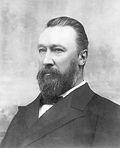History
Delay in creation (1901–1912)

While William Lyne, in his role as the first Minister for Home Affairs, had been working on a draft Bill as early as January 1901 to establish the Commission, [5] fiscal pressures brought on by the Braddon Clause [b] discouraged efforts to assure its passage before 1911, as its establishment was viewed to be a luxury. [7] Lobbying efforts by the Australian shipping industry, incensed that the Commission's scope would include ocean navigation, also contributed to the delay. [8] As a result, the initial Bill lapsed in 1902. [8]
No attempts were made during the Second Parliament of Australia, owing to the House seats split almost evenly between the Protectionist Party, the Free Trade Party and the new Labour Party. [9] [c]
The next effort to consider the proposal occurred in the Third Parliament of Australia in 1909, when Senator Sir Robert Best introduced the corresponding bill. It failed to proceed, notably because it was also intended to be an industrial tribunal with power to decide whether certain State industrial awards constituted unfair business competition between the States, [11] but the States declined to pass the necessary legislation under the referral power to make the Commission work. [11]
The commission's establishment occurred during the Fourth Parliament of Australia, at which time State practices concerning interstate rivalry and discrimination were becoming quite blatant. [12] Prime Minister Andrew Fisher pushed through the appropriate implementing legislation [13] in 1912. [12]
First establishment (1912–1920)

In 1913, the newly elected Cook government appointed Albert Piddington as Chief Commissioner, joining George Swinburne and Sir Nicholas Lockyer. [14]
In addition to wide powers of investigation, [15] the Inter-State Commission Act 1912 granted the Commission judicial power which was broad in scope:
24. The Commission shall have jurisdiction to hear and determine any complaint, dispute, or question, and to adjudicate upon any matter arising as to—
- (a) any preference, advantage, prejudice, disadvantage, or discrimination given or made by any State or by any State authority or by any common carrier in contravention of this Act, or of the provisions of the Constitution relating to trade and commerce or any law made thereunder;
- (b) the justice or reasonableness of any rate in respect of inter-state commerce, or affecting such commerce;
- (c) anything done or omitted to be done by any State or by any State Authority or by any common carrier or by any person in contravention of this Act or of the provisions of the Constitution relating to trade or commerce or any law made thereunder.
The High Court of Australia disagreed in 1915, ruling by 4–2 in the Wheat Case [16] that the Constitution implicitly created a separation of powers, and therefore judicial power can only be vested in the judiciary. [d] Furthermore, it was held that Chapter Three of the Constitution had the effect that a court must have the following features:
- being vested with judicial power;
- not being vested with power other than judicial power; and
- its members having security of tenure, meaning that members are appointed for life. [e]
The Commission as it then existed violated all three criteria. Hence, as it was not part of the judiciary (i.e., not a "Chapter Three Court"), it could not be vested with judicial power. As a result, the s. 73 provision providing for appeals on questions of law from the Commission to the High Court has been 'dead letter law' for most of the Court's history.
Having lost its judicial power in 1915, the Commission "became a body of inquiry without any power of enforcing its decisions." [20] The Commission, without any real purpose, lapsed in 1920 when the terms of the initial Commissioners expired and new appointments were not made. [21] Although there was discussion in the 1930s about reviving the Commission [22] (and a bill on that matter actually received Senate passage in 1938 [23] ), nothing came about, and the Act itself was formally repealed in 1950. [24]
Second establishment (1975–1990)
The Commission was reconstituted by the Whitlam Government in 1975 with the envisaged role of inquiring into transport issues that arose due to the federal structure of the Australian government. [25] Issues on the agenda included Victorian shipping to the Riverina; Bass Strait ferries; and disruptions to Fremantle shipping to the eastern states in 1975. In this second incarnation, the Commission did not have any judicial power, but did have powers of arbitration and adjudication, and of investigation and reporting.
The Commission did not become active due to the dismissal of the Whitlam Government. In 1984, following the re-election of Labor Party under Bob Hawke, the Commission received its appointments and was charged with investigating all matters relating to interstate transport. Its first President was the judge Merv Everett. [26]
In 1990, the Commission was abolished with its functions transferred to a new Industry Commission, [27] a statutory body directly responsible to the Commonwealth Government. [21]